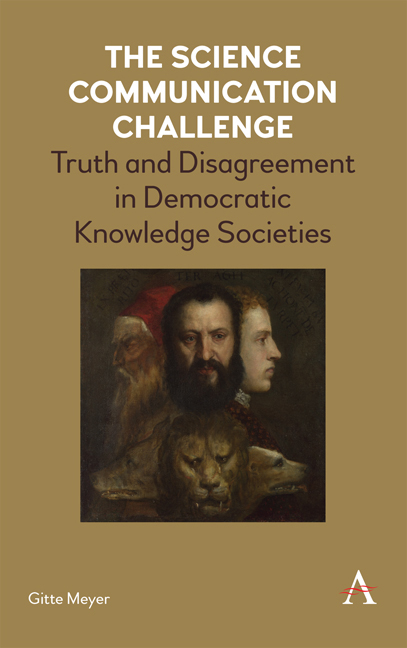Book contents
1 - Science Communication in Democratic Knowledge Societies
Published online by Cambridge University Press: 21 June 2018
Summary
Science communication idea(l)s are also science idea(l)s. They cannot help but be so. Understandings of science communication and the consequent science communication practices are based on assumptions about science and the roles of science and scientists in society. The currently dominant understandings have a built- in aversion to think about and enquire into their underlying assumptions, but it is urgent, this book argues, that we do actually think about and enquire into such basic ideas and that we open them up for inspection, exchange and possible revisions. It is urgent because the mainstream approaches to science communication may serve to inadvertently erode the societal context that facilitated the development of modern science as an intellectual endeavour and without which it may prove increasingly difficult to maintain science in that sense.
Modern science spent significant moments of its infancy in the coffee house atmosphere of the Enlightenment era, in an intellectual climate of commitment to free speech and free enquiry, marked by a vivid engagement with societal issues. A modern public of reasoning citizens, the backbone of any civil society, was beginning to materialize. With their eagerness to exchange opinions and their omnivorous interest in just about everything, they were preparing the ground for the modern democratic institution of public discussion on public affairs. Early modern scientists contributed to, and the development of modern science was nursed and protected by, this liberal and pluralistic intellectual climate. It is a significant component of the luggage of modern science, which could hardly have reached maturity without it. But it is fragile freight, vulnerable in particular to those other elements of historical luggage that originate in religious strife, civil war and a commitment to monistic truth- seeking.
There appear to be no traces of a pluralistic heritage in the dominant science communication paradigm, pursued as a matter of routine by the majority of participants in exchanges on science- related issues. The paradigm focuses on the dissemination of scientific truth- claims but does not know how to deal with disagreement as anything other than disorder, and is impotent when it comes to, or ought to come to, exchanges among different points of view.
- Type
- Chapter
- Information
- The Science Communication ChallengeTruth and Disagreement in Democratic Knowledge Societies, pp. 1 - 24Publisher: Anthem PressPrint publication year: 2018



